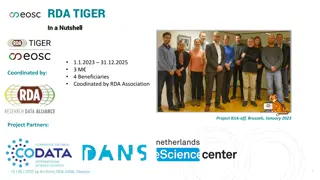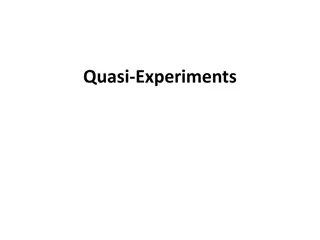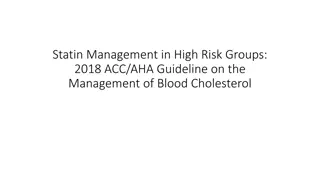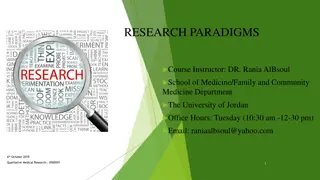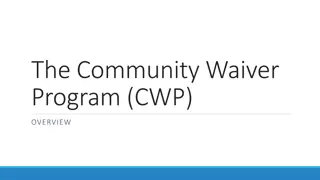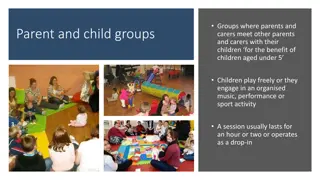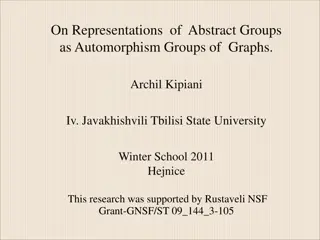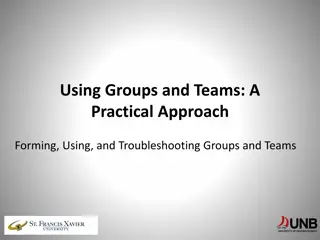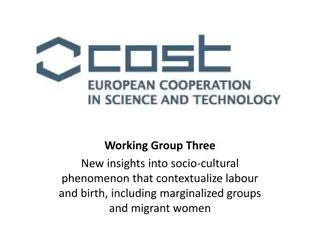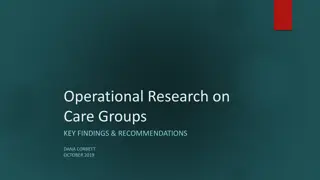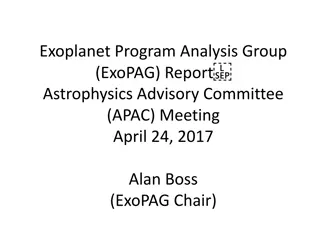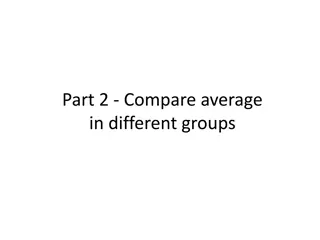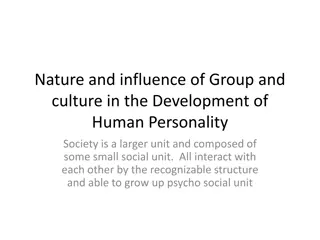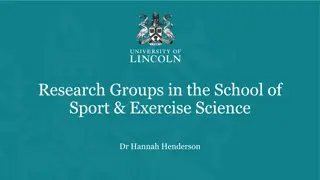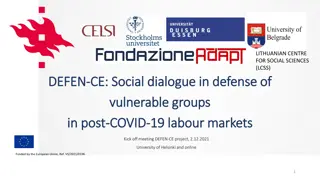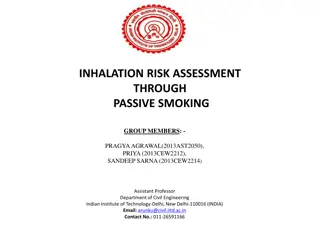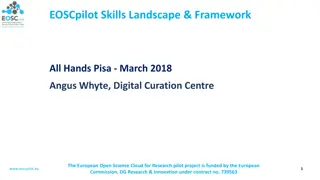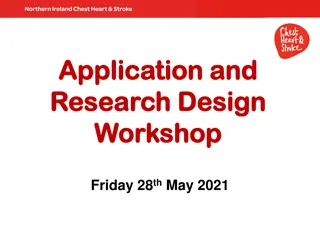Types of groups and reactions
This information discusses electron-donating groups (EDGs) and electron-withdrawing groups (EWGs), their effects on molecule reactivity, examples of each group, nucleophiles, and electrophiles. EDGs increase electron density, making nucleophiles stronger, while EWGs decrease electron density, making
0 views • 14 slides
Class Groups Are They the Future of Collaborative Learning
The traditional classroom setting, with rows of students facing a teacher at the front, has dominated education for centuries. However, the rise of technology and the evolving needs of the 21st century workforce are pushing the boundaries of learning. Enter Class Groups, a concept that reimagines th
4 views • 3 slides
Understanding the Formulation of Hypothesis and Research Problem Definition
Research problems arise from situations requiring solutions, faced by individuals, groups, organizations, or society. Researchers define research problems through questions or issues they aim to answer or solve. Various sources such as intuitions, research studies, brainstorming sessions, and consul
5 views • 25 slides
UCC Research Support and Strategies Overview
UCC's Research Support, Policy & Strategy function, led by David O'Connell, PhD, provides comprehensive support for research activities at the university. The office manages research funding, monitors performance, and facilitates engagement with external stakeholders. UCC's involvement in Horizon Eu
3 views • 17 slides
Understanding Functional Groups in Organic Chemistry
Functional groups in organic chemistry are specific groups of atoms within molecules that determine the chemical properties of the compound. This content provides visual representations and descriptions of various functional groups such as alkanes, alkenes, alcohols, aldehydes, acids, and esters. Le
0 views • 38 slides
Understanding Interest Groups and Political Parties in American Politics
Interest groups play a significant role in American politics, aiming to influence government decisions through lobbyists and various strategies. They represent different interests such as economic, public, and intergovernmental. Lobbyists engage with federal branches and judicial institutions, utili
0 views • 7 slides
RDA TIGER - Internationalization Support for Research Data Alliance Working Groups
RDA TIGER, through its services, facilitates the internationalization of EOSC developments by supporting Research Data Alliance Working Groups. It provides assistance in initiating and running WG, engaging international partners, communicating activities, offering small grants, and helping create im
0 views • 7 slides
Understanding Quasi-Experiments in Research
Quasi-experiments are research studies that resemble experiments but do not involve random assignment of participants to treatment groups. This approach is taken when random assignment is challenging or when ethical considerations come into play. Unlike true experiments, quasi-experiments can provid
0 views • 15 slides
Guideline for Statin Management in High-Risk Groups - 2018 ACC/AHA
This guideline outlines the management of blood cholesterol in high-risk groups according to the 2018 ACC/AHA recommendations. It discusses the overall approach, different statin management groups, justification for statin use in high-risk populations, high and moderate-intensity statin therapy, and
1 views • 14 slides
Understanding Interest Groups in Texas
Explore the role and influence of interest groups in Texas politics, including theories, types of groups, activities, and the impact of lobbying. Learn about incentives for joining, the free rider problem, and the various benefits interest groups offer. Discover the different types of interest group
0 views • 15 slides
Overview of Research Problem Identification and Formulation
Understanding the importance of defining a research problem, this content delves into the selection and formulation of research problems, the definition of a research problem, reasons for defining it, methods for identifying research problems, sources of research problems, and considerations in sele
1 views • 11 slides
Understanding the Role of Interest Groups in Politics
Interest groups are organizations with shared policy goals that influence the policy process. They differ from political parties as they focus on specific policies. Theories of interest group politics include pluralist, elite, and hyperpluralist perspectives. Hyperpluralism suggests that groups beco
0 views • 22 slides
Understanding Research Paradigms in Qualitative Medical Research
Delve into the world of research paradigms in qualitative medical research with a focus on the key differences between objective and subjective research, the meaning of research paradigms, components of research paradigms, types of research paradigms, and how paradigms guide the selection of researc
0 views • 42 slides
Understanding Chemical Groups and Macromolecules in Biological Processes
In biological processes, certain chemical groups play crucial roles in molecular functions. These functional groups, including hydroxyl, carbonyl, carboxyl, amino, sulfhydryl, phosphate, and methyl, are essential for the structure and function of biological molecules. Additionally, macromolecules, s
0 views • 9 slides
Guidelines for Selecting Research Project Topics in Environmental Health
Research is crucial for addressing environmental health issues. Choosing a good research topic is the first step towards effective research. This paper discusses the meaning, characteristics, types of research, and the research process to help in selecting appropriate research topics. Understanding
0 views • 15 slides
University of Deusto School of Psychology - Research and Collaboration Opportunities
The University of Deusto's School of Psychology offers a range of programs in psychology, including undergraduate and master's degrees, as well as research opportunities in various areas such as clinical assessment, stress research, neuropsychology, family psychology, and experimental psychology. Th
0 views • 17 slides
Overview of the Community Waiver Program (CWP) and Enrollment Groups
The Community Waiver Program (CWP) aims to support full participation in communities, preserve natural living arrangements, and reduce waiting lists by offering targeted services to different enrollment groups. The program includes three authorities: 1915(c) Waiver, 1915(i) State Plan Amendment, and
0 views • 58 slides
Physics Department Research Committee Activities Report
The Physics Department Research Committee from Oct. 15, 2015, to April 30, 2016, focused on enhancing research visibility, inviting visitors, strengthening research groups, exploring nuclear radiation physics, optimizing lab space, acquiring research equipment, and more. Specific tasks included crea
0 views • 9 slides
Guidelines for Parent and Child Groups Under 5 Years Old
Parent and child groups for children under 5 provide a space for families to connect while children play freely or participate in structured activities. Sessions last for an hour or two with a maximum of 30 attendees. Indoor singing is limited to 6 adults, with good ventilation, while outdoor singin
2 views • 5 slides
Representation of Abstract Groups through Graphs
Explore the representation of abstract groups as automorphism groups of graphs, touching on topics such as the existence of graphs whose automorphism groups are isomorphic to given abstract groups, the cardinality of connected graphs satisfying specific properties, and questions regarding the cardin
0 views • 16 slides
Practical Approach to Using Groups and Teams in Classroom Settings
This workshop focuses on utilizing groups and teams in educational environments, providing techniques to form diverse and effective groups, outlining key principles, exploring low and high-risk activities, discussing different forms of peer assessment, and addressing challenges associated with group
0 views • 27 slides
Insights into Labour and Birth Among Marginalized Groups and Migrant Women
This content discusses new insights into socio-cultural phenomena surrounding labour and birth, particularly focusing on marginalized groups and migrant women. It includes details on sub-working groups, updates, and plans within this topic area, such as experiences of labour and birth, optimizing ch
0 views • 22 slides
Insights from Operational Research on Care Groups
Key findings and recommendations from operational research on care groups conducted by Dana Corbett in October 2019. The research explored various topics such as roles of volunteers and promoters, barriers to meeting responsibilities, motivators for participation, ideal meeting times, and more. Insi
0 views • 21 slides
Challenges in Self-Help Research in Germany
Exploring the landscape of self-help research in Germany reveals various challenges and obstacles faced by researchers in studying self-help initiatives. The research delves into different aspects such as research scope, involvement of various groups, and the entities conducting research in this dom
0 views • 14 slides
Understanding Organic Chemistry: Functional Groups and Naming Rules
Delve into the world of organic chemistry with a focus on functional groups like alcohols, ethers, aldehydes, and ketones. Explore the rules for naming these compounds, understanding their structures, and how they impact the properties of molecules. From alcohols with hydroxy groups to ketones conta
0 views • 21 slides
ExoPAG Analysis Groups and Membership Changes
The report discusses the analysis groups and membership changes within the Exoplanet Program Analysis Group (ExoPAG) and highlights the losses and additions in the ExoPAG Executive Committee (EC) membership. It also outlines the completed and active study analysis groups focusing on various aspects
0 views • 19 slides
Understanding Pressure Groups and Their Influence on Decision-Making
Pressure groups are formed by like-minded individuals to influence decision-makers by drawing attention to specific issues, with the aim of impacting legislation and existing laws. People join pressure groups seeking to address particular issues more effectively than through mainstream politics. Whi
0 views • 25 slides
Comparing Average in Different Groups: Paired vs. Independent Samples
In statistical analysis, comparing averages in different groups is essential for various research scenarios. This involves distinguishing between paired observations and independent samples, leading to different t-tests for analysis. Understanding these concepts is crucial for making accurate compar
0 views • 112 slides
Hierarchy of Housing Board and Covid-19 Response Groups
Focus on Covid-19 response with various groups established for coordination. Housing Board utilizes existing networks for input and feedback, encourages collaborative efforts among partners, and engages in consultations and projects. Addresses issues related to rough sleepers, vulnerable groups, and
0 views • 12 slides
Influence of Group and Culture on Human Personality Development
Society functions as a cohesive unit composed of smaller social groups that interact and shape individuals' psycho-social development. The difference between mechanical aggregates and psycho-social units lies in the emotional connections and responsibilities present in the latter. Groups like family
0 views • 8 slides
Research Groups and Directions in School of Sport & Exercise Science
Explore the diverse research groups within the School of Sport & Exercise Science, led by experts like Dr. Hannah Henderson. From biomechanics to performance psychology, these groups delve into various aspects of sports science. Discover themes such as performance optimization, social science, and w
0 views • 6 slides
Engaging OEF/OIF/OND Veterans in VA Research Through Moderated Focus Groups
This webinar conducted by Tracy Wellens, Ph.D., focuses on the importance of using moderated focus groups to engage OEF/OIF/OND Veterans in VA research. It covers the definition and benefits of focus groups, how they work, and a practical example from Cooperative Studies Program #595. The project ai
0 views • 55 slides
Social Dialogue in Defense of Vulnerable Groups in Post-COVID-19 Labour Markets
The Lithuanian Centre for Social Sciences (LCSS) is hosting the DEFEN-CE project kickoff meeting at the University of Helsinki, focusing on social dialogue in defense of vulnerable groups in post-COVID-19 labor markets. The project aims to explore the role of social dialogue in addressing employment
0 views • 33 slides
Decode the Food Groups Challenge
Test your knowledge of food groups by decoding the names of different food groups based on hints provided for each. Identify the food groups where nutritious foods like oatmeal, mango, yogurt, soy milk, nuts, and spinach belong. Challenge yourself to decipher the encoded words and improve your under
0 views • 5 slides
Student Interest Group Policy Changes Overview
Student Interest Group Policy Changes involve implementing new criteria for student interest groups, setting membership requirements for preclinical and clinical years, consolidating existing groups, and establishing new interest groups. The policy includes guidelines on events, fundraisers, faculty
0 views • 9 slides
Inhalation Risk Assessment Through Passive Smoking: Research Findings by IIT-Delhi
A research study conducted by a group of researchers at the Indian Institute of Technology-Delhi focused on assessing the inhalation risks associated with passive smoking. The study involved surveying 142 individuals who were divided into different groups based on age and exposure levels. Risk analy
0 views • 5 slides
Understanding Competences, Skills, and Stewardship in Research for the European Open Science Cloud
The European Open Science Cloud pilot project aims to link competences, skills, and capabilities for stewardship in research. It explores the connection between competences, capabilities needed by research teams for the EOSC environment, and skills required for open data science. The importance of s
0 views • 19 slides
Exploring Research Design and Funding Priorities in Northern Ireland
Dive into the world of research at the upcoming Application and Research Design Workshop scheduled for Friday, 28th May 2021. Discover the strategic priorities driving impactful research initiatives, learn about current research projects, funding processes, and collaborations. Explore the rich histo
0 views • 37 slides
Understanding Cyclic Groups and Discrete Logarithms
Exploring the concepts of cyclic groups and discrete logarithms in group theory. This presentation covers the definition of generators, examples of cyclic groups, important theorems related to prime orders and cyclic groups, uniform sampling in cyclic groups, and the discrete logarithm problem. Exam
0 views • 14 slides
Understanding Transformer Vector Groups in Transformer Systems
Transformer vector groups play a crucial role in determining the phase relationships between high and low voltage sides in transformer windings. Proper understanding of vector groups is essential for parallel connection of transformers to prevent phase differences and potential short circuits. The a
0 views • 36 slides






